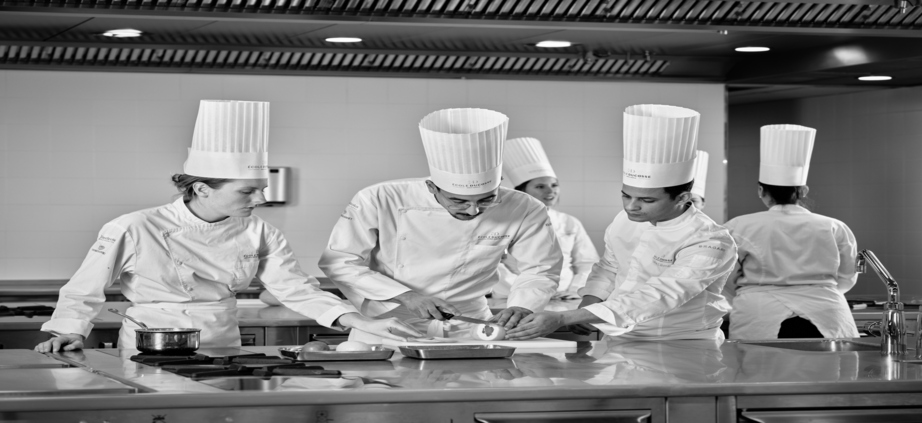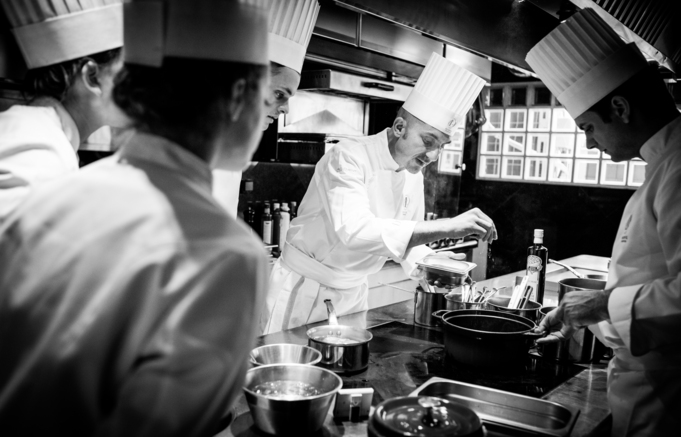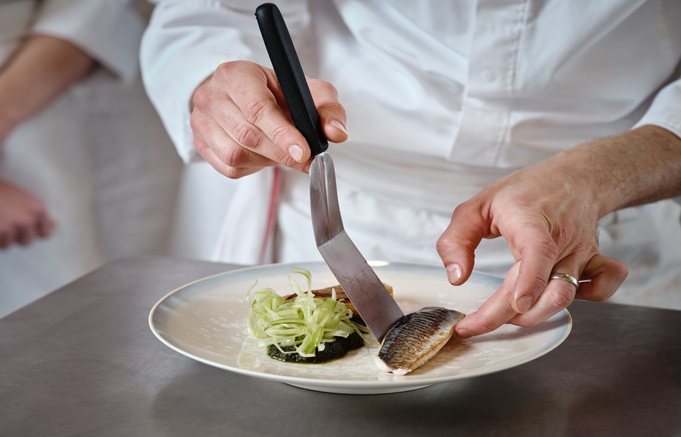Executive chef vs. head chef: which is right for me

There are many different roles in the culinary world and it can be hard to know what exactly each one involves. Whether you're a high school student, an aspiring chef, or working in the culinary industry, it can help to know which position you are aiming for.
In this article, we'll go over the main difference between head chef and executive chef in a professional kitchen. We'll also highlight the practical skills and management skills needed for these roles. Plus, we'll discuss what study options there are in our culinary school in France that can help set you on the path to an exciting career path in the culinary arts.
What does the executive chef do?
Typically, only large establishments or restaurants with multiple branches will have executive chef roles. In any restaurant where they have this title, the executive chef is the top person in the kitchen hierarchy and runs the whole professional kitchen.
Despite having the chef title, many of the day-to-day activities of an executive chef are more focused on management and administration. This role can be equivalent to a kitchen manager role. This will often mean that an executive chef does not normally cook meals or do much food preparation, though it is still vital for this person to have a good knowledge of the culinary arts.
Some of the day-to-day tasks of an executive chef are:
- Managing supply chains for ingredients
- Costing and budgeting
- Planning and revising menus
- Overseeing special events Planning kitchen operations
Executive chef skills and qualifications
While an executive chef might not do much cooking or food preparation on a day-to-day basis, you would still need to have a strong culinary background for this type of role. This includes more than just knowing how to cook - you would also need to know about all kitchen operations.
You would need to know how to create a menu that considered the concept, location, and available products of the restaurant. You'd also need to know how to handle the constantly changing demands and socio-economic factors that dictate culinary trends. On top of this, executive chefs have to have the business expertise to manage restaurant operations, budgets, and more.
Exemplary culinary courses from Ecole Ducasse This nine-month intensive course can give you culinary skills as well as the managerial and entrepreneurial skills ideal for career-changers or entry-level professionals.
Culinary Arts Diploma
Executive chef salary expectations
Your potential salary as an executive chef will depend on what type of position and restaurant you end up working in. Large restaurants, chains, catering companies, and even culinary consultancy companies will all offer different salaries to their executive chefs. You could expect to get a higher salary than anyone else in the kitchen brigade with this kind of role.
What is a head chef?
In establishments that have an executive chef, the head chef is the second in command. As a head chef, you would be expected to directly manage the other chefs in the kitchen as well as the whole kitchen brigade, plus handle more of the day-to-day running.
Again, there might not be much cooking involved, except when needed. A head chef is more likely to do any particularly delicate parts of meal preparation, or they might need to assist where other chefs have difficulties.
Generally, though, most of the cooking will be done by less senior chefs, while a head chef will oversee them. The head chef needs to be familiar with the different types of chefs and all of their duties to manage them properly.
Some of the duties of a head chef include:
- Managing kitchen supplies
- Assisting other chefs with problems
- Helping with menu revisions and choices.
In smaller restaurants or establishments where there isn't a separate executive chef, the head chef will often also carry out the duties of the executive chef. This means that it's important to check job openings carefully to see what a head chef role will include.

Head chef skills and qualifications
A head chef will need to have many of the same skills as an executive chef. Your culinary skills will need to be first-class to help in the kitchen and oversee other chefs. You will also need to have good organizational and people skills, since you will be dealing directly with other staff members and assigning duties. It's also important for head chefs to know about the business side of a kitchen, including costs, best practices, and more.
Head chef salary expectations
The salary for a head chef will depend on the size of the restaurant, the area, and the exact duties you are expected to take on. If you are a head chef that also handles executive chef duties, you could expect a higher salary compared to a head chef that works under an executive chef.
Choosing a career in a restaurant kitchen
There are plenty of other culinary careers in a restaurant kitchen and lots of different types of chefs. Looking at the kitchen hierarchy can help you decide which is the right path for you.
Executive chef
The executive chef handles much of the organization and will act as a kitchen manager, mixing practical skills and management skills.
Head chef (chef de cuisine)
The head chef runs the kitchen they work in, and might have management duties if their restaurant is small or medium-sized. They will have all the skills of a professional cook but also management skills.
Deputy chef (sous chef)
The sous chef works directly under the head chef. They will usually have a more hands-on role in the kitchen. This includes being responsible for quality control of all dishes that the kitchen produces, as well as often directing how the food is presented, handling substitutions, complex culinary skills, and training newcomers.
They will often also stand in for the head chef when needed. Deputy chef is a much more cooking-focused role than an executive chef or head chef.
Station chef (chef de parties)
Station chefs are called this because they work at a particular station, and are generally in charge of a particular area, including:
- Butcher chefs for meat and poultry preparation
- Fish chefs for seafood preparation
- Fry chefs for handling fried food
- Pastry chefs for desserts and baking
- Sauciers for making sauces and sautéing food.
This list is not exhaustive, and different kitchens will have station chefs according to their size, needs, and how often a task needs to be done. In smaller kitchens, one chef might handle various tasks. This is a very cooking-focused role, with very little admin or management, except for managing junior chefs who work under you. This is one of the top roles for a professional cook who wants to be involved in cooking.
Junior chef (commis chef)
Depending on the size of the restaurant, a junior chef might be a less experienced chef or someone who is still in training. As a junior chef, you would typically be assigned a station chef to learn from, and you would learn their specialty, before possibly being moved to a different station. You would also have to fill in as needed during busy times.
How to decide which role is right for you
If you are unsure which role suits you best, there are plenty of ways to help you decide. Some good methods include: Getting advice from a recruiter in the culinary field Getting work experience in a kitchen Finding online tests to suggest a role based on your preferred working style Studying a culinary course with internships for hands-on experience
- Getting advice from a recruiter in the culinary field
- Getting work experience in a kitchen
- Finding online tests to suggest a role based on your preferred working style
- Studying a culinary course with internships for hands-on experience
More junior roles can often be a great way to get experience for working towards a career as a head chef or executive chef.

Important skills for executive chefs and head chefs
Executive chefs and head chefs do have several skills in common. Some skills you need for these roles will include the following:
Leadership skills
Heading a team of chefs means you need good leadership skills. This includes team management, motivating a team, and working through any issues in your team.
Communication skills
Great written and spoken communication skills are vital. This includes communicating with your team, front-of-house or hospitality staff, suppliers, and potentially with customers if there is an issue.
Diligence
Diligence, self-motivation, and attention to detail are all important for making sure all tasks are completed to consistently high standards.
Time management
A kitchen is a very time-sensitive environment. Good time management is critical for making sure everything runs smoothly, from chefs preparing and sending out dishes, to completing ingredient orders.
How studying a culinary arts Bachelor's degree can help you become a head chef or executive chef
If you are wondering "what can you do with a culinary degree?", then the answer is almost anything in the kitchen environment. A respected culinary arts degree will give you the skills to become a head chef, executive chef, or to take on other restaurant roles. This includes learning about culinary arts as well as management and business skills. You could even use these skills to start your own restaurant.

World-leading culinary education at Ecole Ducasse Study everything you need to know as an executive chef from culinary arts to business management with a culinary arts Bachelor's degree from Ecole Ducasse.
Executive chef vs head chef: summary
The main differences between an executive chef and a head chef lie in their duties. Executive chefs typically have more managerial responsibilities, while head chefs work more closely with the kitchen team and may do some cooking.
However, in smaller restaurants, these roles could be one and the same. If you want to know whether being a chef is a good career choice, or how to become a professional chef, check out our blogs. If you are ready to take that first step and enroll in a culinary arts program, sign up today.


